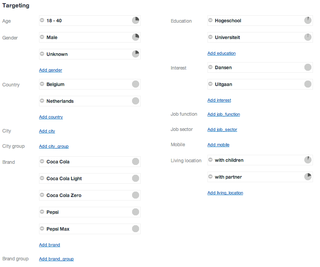
Advertising is the practice and techniques employed to bring attention to a product or service. Advertising aims to put a product or service in the spotlight in hopes of drawing it attention from consumers. It is typically used to promote a specific good or service, but there are wide range of uses, the most common being the commercial advertisement.

Sex appeal in advertising is a common tactic employed to promote products and services. Research indicates that sexually appealing content, including imagery, is often used to shape or alter the consumer's perception of a brand, even if it is not directly related to the product or service being advertised. This approach, known as "sex sells," has become more prevalent among companies, leading to controversies surrounding the use of sexual campaigns in advertising.

Media manipulation refers to orchestrated campaigns in which actors exploit the distinctive features of broadcasting mass communications or digital media platforms to mislead, misinform, or create a narrative that advance their interests and agendas.

Classified advertising is a form of advertising, particularly common in newspapers, online and other periodicals, which may be sold or distributed free of charge. Classified advertisements are much cheaper than larger display advertisements used by businesses, although display advertising is more widespread. They were also commonly called "want" ads, starting in 1763, and are sometimes called small ads in Britain.
Pay-per-click (PPC) is an internet advertising model used to drive traffic to websites, in which an advertiser pays a publisher when the ad is clicked.
An online advertising network or ad network is a company that connects advertisers to websites that want to host advertisements. The key function of an ad network is an aggregation of ad supply from publishers and matching it with the advertiser's demand. The phrase "ad network" by itself is media-neutral in the sense that there can be a "Television Ad Network" or a "Print Ad Network", but is increasingly used to mean "online ad network" as the effect of aggregation of publisher ad space and sale to advertisers is most commonly seen in the online space. The fundamental difference between traditional media ad networks and online ad networks is that online ad networks use a central ad server to deliver advertisements to consumers, which enables targeting, tracking and reporting of impressions in ways not possible with analog media alternatives.
Online advertising, also known as online marketing, Internet advertising, digital advertising or web advertising, is a form of marketing and advertising that uses the Internet to promote products and services to audiences and platform users. Online advertising includes email marketing, search engine marketing (SEM), social media marketing, many types of display advertising, and mobile advertising. Advertisements are increasingly being delivered via automated software systems operating across multiple websites, media services and platforms, known as programmatic advertising.
A weekly newspaper is a general-news or current affairs publication that is issued once or twice a week in a wide variety broadsheet, magazine, and digital formats. Similarly, a biweekly newspaper is published once every two weeks. Weekly newspapers tend to have smaller circulations than daily newspapers, and often cover smaller territories, such as one or more smaller towns, a rural county, or a few neighborhoods in a large city. Frequently, weeklies cover local news and engage in community journalism.

In politics, campaign advertising is propaganda through the media to influence a political debate and, ultimately, voters. Political consultants and political campaign staff design these ads. Many countries restrict the use of broadcast media to broadcast political messages. In the European Union, many countries do not permit paid-for TV or radio advertising for fear that wealthy groups will gain control of airtime, making fair play impossible and distorting the political debate.
Website monetization is the process of converting existing traffic being sent to a particular website into revenue. The most popular ways of monetizing a website are by implementing pay per click (PPC) and cost per impression (CPI/CPM) advertising. Various ad networks facilitate a webmaster in placing advertisements on pages of the website to benefit from the traffic the site is experiencing.

Targeted advertising is a form of advertising, including online advertising, that is directed towards an audience with certain traits, based on the product or person the advertiser is promoting.
Social network advertising, also known as "social media targeting," is a group of terms used to describe forms of online advertising and digital marketing focusing on social networking services. One of the significant benefits of this type of advertising is that advertisers can take advantage of the users' demographic information, psychographics, and other data points to target their ads appropriately.
The Nigerian Observer is a daily newspaper published in Benin City, Edo State, Nigeria. It has been published since 29 May 1968. The publisher, Bendel Newspapers Company Limited, is owned by the Edo State Government.

Social media marketing is the use of social media platforms and websites to promote a product or service. Although the terms e-marketing and digital marketing are still dominant in academia, social media marketing is becoming more popular for both practitioners and researchers. Most social media platforms have built-in data analytics tools, enabling companies to track the progress, success, and engagement of social media marketing campaigns. Companies address a range of stakeholders through social media marketing, including current and potential customers, current and potential employees, journalists, bloggers, and the general public. On a strategic level, social media marketing includes the management of a marketing campaign, governance, setting the scope and the establishment of a firm's desired social media "culture" and "tone".

A newspaper is a periodical publication containing written information about current events and is often typed in black ink with a white or gray background. Newspapers can cover a wide variety of fields such as politics, business, sports, art, and science. They often include materials such as opinion columns, weather forecasts, reviews of local services, obituaries, birth notices, crosswords, editorial cartoons, comic strips, and advice columns.
Advertising is a form of selling a product to a certain audience in which communication is intended to persuade an audience to purchase products, ideals or services regardless of whether they want or need them. While advertising can be seen as a way to inform the audience about a certain product or idea it also comes with a cost because the sellers have to find a way to show the seller interest in their product. It is not without social costs. Unsolicited commercial email and other forms of spam have become so prevalent that they are a major nuisance to internet users, as well as being a financial burden on internet service providers. Advertising increasingly invades public spaces, such as schools, which some critics argue is a form of child exploitation. Advertising frequently uses psychological pressure on the intended consumer, which may be harmful. As a result of these criticisms, the advertising industry has seen low approval rates in surveys and negative cultural portrayals.

Newspaper display advertising is a form of newspaper advertisement - where the advertisement appears alongside regular editorial content. Display ads are generally used by businesses and corporations towards promotion of their goods and services and are generally for larger budget clients. Display ads appear in all sections of the newspaper except the editorial page, obituary page, and classified section.
Native advertising, also called sponsored content, partner content, and branded journalism, is a type of paid advertising that appears in the style and format of the content near the advertisement's placement. It manifests as a post, image, video, article or editorial piece of content. In some cases it functions like an advertorial. The word native refers to this coherence of the content with the other media that appear on the platform.
Google Contributor was a program run by Google that allowed users in the Google Network of content sites to view the websites without any advertisements that are administered, sorted, and maintained by Google.
In media ethics, brown envelope journalism (BEJ) is a term used to describe the practice of journalists accepting monetary or other incentives in exchange for favorable news coverage or the suppression of negative information. The phenomenon undermines journalistic integrity and the independence of the media, leading to biased reporting influenced by external interests. The practice is not limited to one country, rather it is observed in other African countries, namely Tanzania, Nigeria, and in Ghana where it is called soli and in Cameroon where it is known as gombo. The practice is also reported in Gulf countries such as Kuwait.








